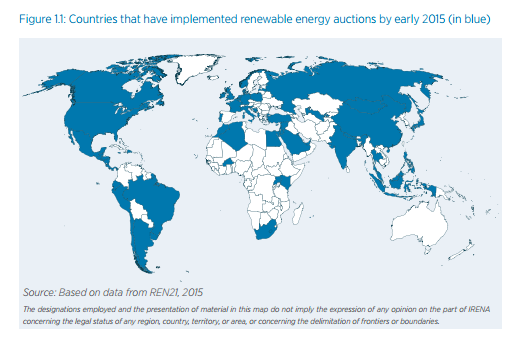

Renewable Energy Auctions: New Best-Practice Guide Steers Global Adoption
Newsletter
The popularity of renewable energy auctions is on the rise as countries worldwide seek the best means to reach their sustainability targets. More than 60 countries have now adopted renewable energy auctions, up from just six in 2005.
“Auctions have been a tremendous support to India’s renewable energy programme. Through auctions, we discovered the real market price for solar power, which has decreased almost 65 per cent since 2010." - Mr. Upendra Tripathy, Secretary to the Government, Ministry of New and Renewable Energy, India
But what are renewable energy auctions, and why are so many countries choosing to implement them?
IRENA's new Renewable Energy Auctions: a Guide to Design can answer those questions. The six-volume guidebook analyses auction design elements and highlights best practices for policy-makers and investors considering auctions in their own countries. It finds that auctions around the world attract investment and decrease costs through competition.

In South Africa for example, a commitment to multiple bidding rounds increased the number of bids by nearly 50 percent and decreased the cost of photovoltaic and wind by 39 and 23 percent respectively. Similarly in the United Arab Emirates, an auction in Dubai this year contracted for the lowest-ever price of electricity from a solar park, without financial support, at less than US 6 cents per kilowatt-hour.
“This guide provides both high-level and technical support to policy makers considering auctions as a means to reach their sustainability targets. Its release is timely and can help support the growth of auctions as a policy tool for renewable energy deployment.” - Rabia Ferroukhi, IRENA Deputy Director of Knowledge, Policy and Finance and a lead author on the report
The new guidebook includes a summary for policy makers and an overview of renewable energy policies and auctions. It also includes technical auction design sections on demand, qualification requirements, the winner selection process and sellers’ liabilities.




